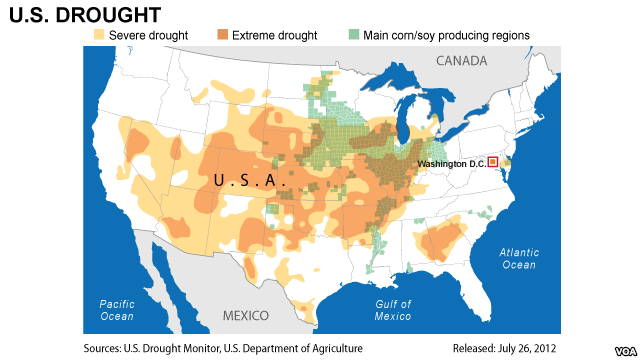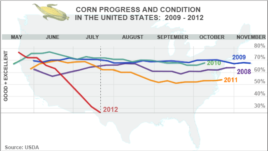Suicidal fuel – corn ethanol driving up world food prices in drought
“Here in the U.S., biofuel uses probably 30 percent of U.S. corn. And considering [the] very high maize price right now, it would be very wise to stop using maize or corn for biofuel production. The U.S. right now has a mandate for ethanol content in fuel. I think it should be very, very wise for [the] U.S. to stop doing that. And Europe should also stop doing that as well,”

By Joe DeCapua at Voice of America
The United States is the leading producer of corn and soybeans – two commodities that developing countries rely on. However, over the past two months, prices have risen sharply as the U.S. experiences its worst drought since the 1950s. A food policy expert says effectively responding to the drought can help prevent another global food crisis
More than half the United States is experiencing the dual problems of too little rain and temperatures that are too high. Shenggen Fan, head of the International Food Policy Research Institute, said that’s not only driving up prices, but contributing to price volatility as well.
“The U.S. plays a huge role in global food security. The U.S. is the largest food exporter – soybeans, maize and many other food commodities. So anything [that] happens in the U.S. will have global significance,” he said.
The decline in maize production has boosted prices by 30 percent in the past two months. Soybean prices are up 19 percent.
Fan said, “Last weekend’s rain may have helped a little bit, but we think the drought may come back and will continue to affect both soybean and maize production.”
 The price rises for corn and soybeans have a major negative effect on another important commodity – wheat.
The price rises for corn and soybeans have a major negative effect on another important commodity – wheat.
“Wheat prices have followed maize price very closely, and that will have more impact [on] some poorer countries in the Middle East. Many countries do import wheat not only from [the] U.S., but also from other countries,” he said.
Fan said that droughts in the United States and other countries are not the result of occasional variations in seasonal weather patterns, but rather climate change.
“It is clear that extreme weather events have come to hit us more often. So we have seen frequency as well as intensity increase over the last several decades. And it’s not only here in the U.S., but also in other parts of the world. More drought and heat in Russia, more floods in China. India is experiencing a very weak monsoon that will also affect their rice production. So definitely climate change is affecting global food production,” he said.
China is the world’s largest importer of soybeans, and much comes from the U.S. China uses soybeans for animal feed. So a rise in soybean prices could lead to higher meat prices. Latin American countries are in a similar situation.
The IFPRI director general has made a number of recommendations–one of which would directly affect U.S. energy policy.
“Here in the U.S., biofuel uses probably 30 percent of U.S. corn. And considering [the] very high maize price right now, it would be very wise to stop using maize or corn for biofuel production. The U.S. right now has a mandate for ethanol content in fuel. I think it should be very, very wise for [the] U.S. to stop doing that. And Europe should also stop doing that as well,” he said.
Fan also recommends the U.S., IFPRI, various U.N. agencies and the World Bank closely monitor the situation. That would allow them to take quick action in any emergency. He said large food producing nations should be ready to deploy some of their grain reserves, if need be, and warns countries not to impose bans on exporting food.
“If we don’t take action, I’m afraid another food crisis will come and very soon. So that’s why we need to act together. It’s not here yet, but if we don’t act together I’m afraid the crisis will come,” he said.
The International Food Policy Research Institute continues to recommend increasing agricultural investment in developing countries to ease the volatility of food prices.
Help Make A Difference By Sharing These Articles On Facebook, Twitter And Elsewhere:
